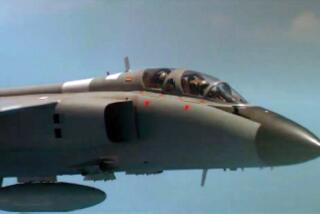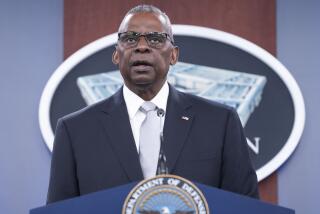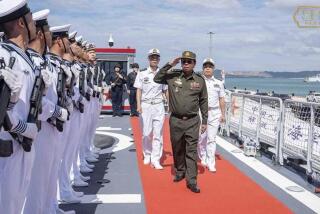U.S. Navy Ships to Visit Chinese Port : Diplomacy: Clinton Administration plans first such call since 1989 protests. Goal is to better military relations.
- Share via
WASHINGTON — The Clinton Administration has decided to have U.S. Navy ships make a port call in China this spring in a new step aimed at improving military cooperation between the two countries, U.S. officials said Wednesday.
It would be the first visit by American warships to China since before that country’s 1989 crackdown on pro-democracy demonstrations. The last port call was a hurried, chaotic one in which American ships pulled into Shanghai as hundreds of thousands of demonstrators were gathering on the streets of Beijing.
“It was a bloody disaster,” recalled James R. Lilley, then the U.S. ambassador to China. “We got the Seventh Fleet out of there fast. The (U.S.) commanders were supposed to fly (from Shanghai) to Beijing for a banquet in the Great Hall of the People, but we canceled that trip. China declared martial law the next day.”
In these more tranquil times, U.S. officials have decided to make a low-profile call to a port in northeastern China.
The exact date has not been set, but a U.S. military official said a decision has already been made that the U.S. Navy will visit China, and Administration officials confirmed there will be a port call this spring.
However, it is not clear that China has given its final, official consent.
A military attache at China’s Embassy in Washington said Wednesday that he has no information about the planned port call.
Despite the apparent similarities to the port calls made to China in the late 1980s, the reasons for the visit are considerably different now.
In the 1980s, the Ronald Reagan and George Bush administrations viewed U.S. port calls as a way of demonstrating that the American and Chinese navies were capable of working together to offset the threat of growing Soviet naval power in the Pacific.
Now, the two countries have no Soviet enemy, and the main purpose for port calls would be to help defuse or stave off tensions between the United States and China, which has been rapidly modernizing its navy.
Last October, the U.S. aircraft carrier Kitty Hawk and a Chinese nuclear submarine squared off in international waters off China in an encounter that demonstrated the growing potential for naval conflict between the two countries.
Although no shots were fired, the captain of the Kitty Hawk dispatched aircraft to track the Chinese vessel with anti-submarine warfare devices, and China responded by scrambling jet fighters.
Afterward, a Chinese official warned that China’s military will have authority to shoot in any future incidents.
Recently, Pentagon officials have said they hope to start talks with Chinese military leaders aimed at setting up procedures that will prevent such incidents.
Defense Secretary William J. Perry, who visited Beijing last fall, has led the way in trying to restore and upgrade ties between U.S. and Chinese military officials. From the 1989 Tian An Men Square upheavals until 1993, there were no high-level contacts of any kind between U.S. and Chinese military officials.
“I think it is important for our government to have a good working relationship with a country as important as China,” Perry told The Times in October.
Some critics said the Pentagon’s efforts conflict with other aspects of Administration policy toward China.
While the Defense and Commerce departments are trying to improve ties with Beijing, U.S. trade officials are threatening China with trade sanctions for copyright violations, and the State Department is condemning China for human rights violations.
“We’ve got some smart people at the Department of Defense, but they’re trying to carry the whole weight of the relationship (with China) on their shoulders,” said Douglas Paal, former head of Asian affairs for Bush’s National Security Council. “There’s no coherent policy behind this.”
Clinton officials responded that the complex ties with China encompass a number of crosscurrents.
“Our relationship with China is greater than the sum of its parts,” one senior Administration official said this week.
Administration officials said a visit to Beijing next week by Winston Lord, assistant secretary of state for East Asia and the Pacific, is aimed at discussing ties between the two nations.
Paal also said he fears that overly frequent visits by uniformed U.S. military officers to Beijing and by Chinese military officers to Washington could produce a backlash in Congress.
More to Read
Sign up for Essential California
The most important California stories and recommendations in your inbox every morning.
You may occasionally receive promotional content from the Los Angeles Times.










